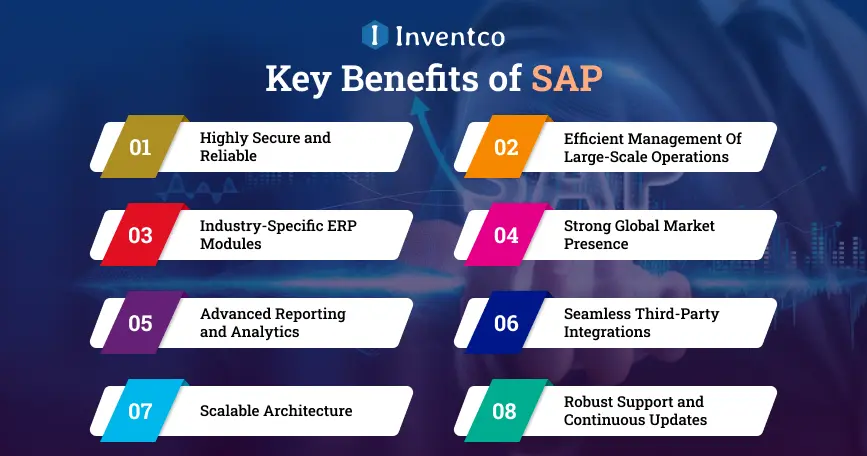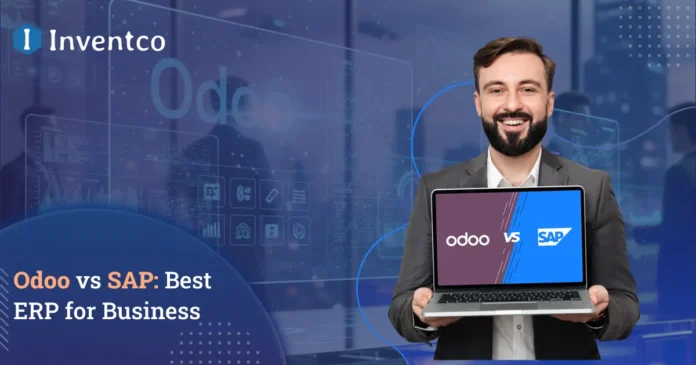The right ERP software can be crucial for efficiency and growth, so it’s important that you select the right ERP software for your business. When we talk about different alternatives, Odoo vs SAP are the leading names for the best ERP solutions that give a cut-throat competition to each other.
Both platforms have unique strengths, features, and options for various industries, but which one suits your business will depend on a variety of factors like the size of your company, budget issues, scalability opportunities and integration requirements.
In this guide, we’ll break down SAP vs Odoo by comparing the features each software has to offer and which one is more user-friendly and could be adapted to your business needs. With this, you can make your decision easier on which ERP solution can fit perfectly to achieve your business goals.
Overview of Odoo and SAP
Enterprise resource planning (ERP) software can streamline business operations, optimize resources, and increase productivity. Among the leaders, Odoo vs SAP ERP are two that need a comparison since both solutions are rich in terms of features, scalable and flexible. But they cater to different types of businesses and needs, so it’s key to know how to leverage these ERP tools.
What is Odoo?
Odoo ERP service is an open-source and highly adaptable software solution that was created to be modular, efficient and affordable.
Available apps range from CRM to eCommerce, and from accounting to manufacturing and project management, making Odoo the world’s most installed management software.
SMEs love Odoo over any big players because of its user-friendly interface, flexibility and affordability, which together help in consolidating operations and scaling without hurdles.
Key Benefits of Odoo:
- Open-Source and Highly Customizable: Odoo is an open-source structure that makes it possible for businesses to change and customize modules in order to work with the ERP according to their own unique workflow and methodologies.
- Affordable for Small and Medium Businesses: Thanks to scalable licences and flexible pricing, SMEs can get their hands on enterprise-standard ERP functionalities at a fair price with Odoo development.
- Wide Range Of Integrated Modules: From sales, finance, HR and CRM to inventory and purchase management, as well as hundreds more – Odoo has everything you need to do a personalized workflow.
- Cloud-Based and On-Premise Deployment Options: Available in either cloud-based or on-premises models to cater to different businesses, allowing you to stay in the know around your business operations – all easily accessible with control of data and infrastructure.
- Scalable to Support Business Growth: With Odoo, you can quickly add new modules and users as the business grows.
- Seamless Third-Party Integrations: It integrates seamlessly with payment gateways, marketing automation tools, shipping carriers and other third-party applications.
- User-Friendly Interface for Faster Adoption: With Odoo’s modern and intuitive interface, you can start using the application in a matter of minutes, as this minimizes the time spent on training new users.
- Strong Community Support and Continuous Updates: Odoo has a large worldwide community for support, and regular updates to provide you with new features of Odoo and SAP, security patches or bug fixes.
What is SAP?
SAP offers the world’s leading organizations its enterprise software to run business processes like manufacturing, inventory, sales & distribution or human resources.
Its solutions, such as SAP Business One, are all about managing the intricate processes of your growing business, including analytics and unique industry accessibility.
SAP is perfect for organizations that want fully-fledged offerings, follow enterprise-grade security guidelines, and need their services to scale as they do.

Key Benefits of SAP:
- Highly Secure and Reliable: SAP provides a level of defence, data security and compliance for businesses at the enterprise level.
- Efficient Management Of Large-Scale Operations: It manages complicated processes over various departments, providing large companies with widespread workflows.
- Industry-Specific ERP Modules: Custom ERP solutions for manufacturing, healthcare, finance, and other industry needs.
- Strong Global Market Presence: With its established track record and extensive usage, SAP is a company with global acceptance among large enterprises.
- Advanced Reporting and Analytics: Powerful reporting and analytics capabilities empower businesses to make smarter decisions based on data.
- Seamless Third-Party Integrations: SAP works with your enterprise systems, tools and apps for easy operations.
- Scalable Architecture: Its ERP can scale with your company, so it will be able to handle more users and functions as time goes on.
- Robust Support and Continuous Updates: SAP offers professional support, periodic updates and feature enhancements to ensure long-term productivity.
Key Features Comparison: Odoo vs SAP
Understanding the features of the Odoo and SAP platforms is the basis for assisting businesses in choosing the right platform for ERP services for them.
Odoo for Businesses:
Odoo’s modular construct consists of over 30 apps, allowing for different configurations for businesses of all types and sizes. Odoo’s reporting and analytical tools are dynamic and designed for ease-of-use, thus permitting seamless tracking of business performance. Also, Odoo is cloud-enabled, allowing for access anywhere, and is cost-effective, especially for small and medium enterprises.
SAP Business Features:
SAP specializes in vertical industry ERP modules, advanced reporting and analytics, and business-class security. Because of its powerful cross-system integration features, SAP is well-suited for large enterprises dealing with the advanced complexities of business operations.
Side-by-Side Feature Comparison
|
Feature
|
Odoo |
SAP Business One
|
| Deployment Options | Cloud / On-Premise | Cloud / On-Premise |
| Customization | High | Moderate to High |
| User Interface | Intuitive & modern | Complex but powerful |
| Industry Solutions | SMB Focus | Large enterprises focus |
| Cost | Affordable | Premium pricing |
| Integration | Moderate | Advanced |
| Scalability | High for growing SMBs | High for large enterprises |
| Reporting & Analytics | Flexible & easy-to-use | Advanced & detailed |
| Security | Standard enterprise-level | Enterprise-grade security |
| Support & Community | Strong community support | Dedicated professional support |
| Mobile Access | Yes, via apps | Yes, via apps |
| Multi-language & Multi-currency | Yes | Yes |
Usability and Flexibility
The usability and flexibility of the ERP system are essential. Odoo is easy to use and has an aesthetically pleasing and modern design. It has also been designed to be highly accessible to small and mid-sized businesses and to be user-friendly to the extent that very minimal training is needed.
With these features, Odoo allows small onboarding training for new employees and enables teams to acclimate quickly. On the other hand, SAP is feature-rich and designed for complex workflows of big enterprises, which makes it very powerful, but also more challenging to implement, in the initial stage of your business, just because it is complex to use.
Flexibility Factor:
When considering SAP vs Odoo, which is better, usability and flexibility are critical for business success.
Odoo:
- Intuitive, modern interface: Odoo’s layout and information are designed in a way that allows each team to quickly use the new system. This reduces training time and onboarding friction.
- Modular design: Odoo’s flexible modules and design allow businesses to scale their operations and add new functionalities and features as the demand for the business scale.
- Quick implementation: The Odoo system is designed to be rapidly deployed and is thus highly suitable for SMEs that need fast results, and can be run effectively without the added complexities.
- User-friendly reporting and analytics: Odoo provides dashboards that are easy to understand, which saves time for controls made for decisions, and helps in tracking performance for effective decisions.
SAP:
- Feature-rich interface: SAP is made for large enterprises that deal with complex inter-departmental workflows and thus provides advanced tools specifically aimed at large enterprises.
- Advanced workflow management: SAP enables organizations to handle complex operations, which streamline the management and interconnect multiple-step processes.
- High customization: SAP supports industry-specific modules with customized configuration to meet unique business needs.
- Requires expert support: To optimize and implement the SAP, you need professional assistance to ensure it is configured correctly for your business needs.
Odoo is the best choice for businesses that are looking for simplicity and scalability, while SAP is ideal for managing large-scale and complex enterprise processes.
Read More: Odoo 18 vs Odoo 19: What’s New and Improved?
Industry-Specific ERP Solutions
When assessing Odoo vs SAP Business One, industry-specific solutions are one of the main key considerations that come to mind. Both platforms provide powerful ERP software for businesses, but you need to figure out which ERP system meets your business’s unique needs for different sectors.
Odoo:
- Retail: Automates point-of-sale, inventory, and customer management, leading to optimized business operations.
- eCommerce: Connects online stores to inventory, sales, and CRM, allowing for efficient order processing.
- SMEs: Provides scalable and affordable options designed for small and medium enterprises.
- Manufacturing: Flexible modules aid in the efficient management of production, inventory, and supply chain.
SAP:
- Manufacturing: Integrates production planning, quality control, and supply chain management.
- Healthcare: Assists in patient management, compliance, and data security.
- Finance: Offers financial institutions advanced analytics, reporting, and compliance.
- Large Enterprises: Provides robust integration and workflows designed for large-scale operations and tailored to specific industries.
Lastly, I just say choosing between Odoo vs SAP depends on business size and complexity. An expert Odoo consulting service ensures smooth implementation, tailored customization, and long-term ERP success.
Integration and Customization Capabilities
Smooth integration and customization are vital for maximizing ERP efficiency. Both Odoo vs SAP offer robust options, but they differ in focus and complexity.
| Capability | Odoo | SAP Business One |
| Third-Party Integration | Moderate, flexible; works well with popular apps and tools | Advanced, enterprise-ready; supports complex enterprise systems |
| Custom Module Development | Easy, thanks to open-source architecture | Moderate; often requires expert developers for customization |
| Cloud Integration | Available; flexible cloud deployment | Available, robust cloud options for large-scale use |
| API Support | Strong; allows seamless automation | Strong; supports complex integrations with enterprise systems |
Odoo is ideal for businesses seeking flexible, scalable customizations, while SAP excels in large-scale, enterprise-level integration.
Choosing the Right ERP for Your Business
Choosing between Odoo and SAP involves various factors that you need to consider to fit your operational complexity, size, and business objectives.
- Business Size: Odoo is a strong fit for small and medium-sized businesses that require its flexible and modular configuration. On the other hand, SAP is more suitable for large companies and enterprises. These organizations typically have intricate workflows and operational requirements that encompass multiple departments.
- Budget: Odoo offers a cost-effective ERP solution, and it also offers scalable pricing, which makes it a perfect choice for companies that are growing. SAP requires a large upfront investment and caters to large organizations that need the enterprise-level features and security.
- Customization Needs: Odoo is more suitable for businesses that need a flexible architecture with custom modules and workflows due to its adaptability. SAP is more rigid, but its robust structures permit advanced customization with expert implementation.
- Industry Requirements: Industries with significant, specific requirements, such as manufacturing, healthcare, and finance, would gain more from SAP’s custom solutions.
How Inventco Supports Your ERP Journey
As a leading Odoo ERP development company, Inventco supports businesses at every stage of their ERP journey. Whether you are migrating from SAP, implementing Odoo for the first time, or working on combining several modules, we provide a solution that fits your budget that will be seamless, efficient, and customized to your requirements.
Our primary goal is streamlining workflows for efficiency. We want to make sure your ERP system grows with your business. By working with Inventco, the value of your Odoo vs SAP investment will be maximized and you will have the ROI you are looking for. We provide unique services and remain available to you for assistance.

Conclusion
The right ERP system is only partially about the provided features. One must consider the business processes, financial context, and expected evolution. The Odoo vs SAP analysis provides the key points for an informed choice. SAP should be selected if enterprise-grade robustness, advanced analysis and reporting features, and strong specifications for a specific industry are a priority. Odoo should be chosen if the business is small or medium and the priorities are flexibility, affordability, and ease of use.
FAQ’s
Q1. Which is better: Odoo or SAP?
Ans. It depends on your business size, budget, and complexity. Odoo suits SMBs, SAP suits large enterprises.
Q2. Is Odoo cheaper than SAP?
Ans. Yes, Odoo’s open-source model and affordable licensing make it more budget-friendly.
Q3. Can Odoo integrate with SAP?
Ans. Yes, with proper APIs and integration tools, Odoo can work alongside SAP systems.
Q4. Does Inventco handle SAP and Odoo implementations?
Ans. Inventco specializes in Odoo development but also provides consultation for businesses transitioning from SAP.
Q5. Which industries benefit most from Odoo vs SAP?
Ans. SMEs, retail, and eCommerce benefit from Odoo; large enterprises in manufacturing, healthcare, and finance benefit from SAP.


